syria

Abram left his homeland on a promise and a prayer. God called. Abram went. The Biblical text makes it seem so simple. There are no signs of struggle or doubt. There is no grief over what is left behind, only the forward look toward a new land and a new future. Leaving home for Abram seems so easy.
As I reflect on this week’s scripture, I’m in Lebanon listening to stories of Syrian refugees who left their countryand their kindred to find a place of refuge. Unlike Abram, they did not leave on the promise that they would become a great nation. They left because bombs fell on their houses. They left because food became scarce. They left because they watched their loved ones die in the rubble as buildings fell to the ground.
As we enter into this season of Lent, it is fitting for us to pause and listen to their stories. Remembering Christ’s suffering is more than an exercise in gratitude. It is a chance for us to stand in solidarity with those around the world who suffer each day. It is a challenge for us to take our own suffering (be it large or small) and connect it to the suffering of others and to the suffering of Christ on the cross.
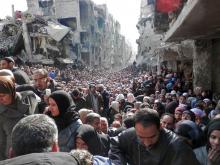
Last week amid the closing of the Olympics, the national debt, and the latest pop culture ‘news,’ this photo was published that encapsulates the volume of pain and suffering that is happening in Syria. For years, the conflict in Syria has gone through its ebbs and flows; it has been in and out of the media’s attention. Even though thousands of people have been displaced and families have been forced to eat animal feed, this is not worthy for American front-page news. Sadly, travesties around the world, or even in our backyard, are categorized as “out of sight, out of mind.” Too often we are consumed by other things than those outside of our limited purview.
When I saw the photo of the suffering of the Syrians, I was shocked; I was shocked that so many people were in line to get food, shocked that despite their best efforts there is not enough food to go around. I felt sad for the people who, by no fault of their own, live in a country that is being ravaged by war, violence, greed, and power struggles. I felt embarrassed for all of the times I whined and complained about my own “problems.” All of them collectively wouldn’t even begin to compare to what people are facing in Syria at this very moment. I wanted to find a way to do something, to raise my voice for them ... anything.
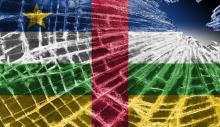
This weekend we’ll commemorate the too-short life and great work of Dr. Martin Luther King Jr. While we rightly celebrate his life dedicated to advancing equality for all, too often we overlook his call to peacemaking. This year, in light of conflicts in Syria, South Sudan, and an often-overlooked war in Central African Republic, we should remember his words.
In his 1967 speech, “Beyond Vietnam — A Time to Break Silence,” King opposed the violence, saying:
"To me the relationship of this ministry [of Jesus Christ] to the making of peace is so obvious that I sometimes marvel at those who ask me why I'm speaking against the war. Could it be that they do not know that the good news was meant for all men — for Communist and capitalist, for their children and ours, for black and for white, for revolutionary and conservative?"
Those aware of our long history at Sojourners know that we have always been committed to peace, to opposing unjust wars and finding nonviolent solutions wherever possible. And in all the work we do, we aim to speak out for the least of these, the poorest and most vulnerable.
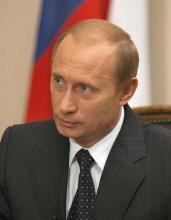
Next week’s summit between Pope Francis and Russian President Vladmir Putin may be the most important meeting between a pontiff and a visiting head of state in nearly a quarter of a century, with war-torn Syria expected to be the top priority.
Francis has met with more than a dozen heads of state or government as pontiff, and Putin has met with both Pope Benedict XVI and Pope John Paul II. But this meeting stands out.
It’s been just four years since full diplomatic ties were re-established between Russia and the Holy See, set against a backdrop of centuries of tension between the Vatican and the Russian Orthodox Church.
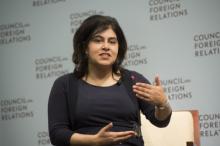
The highest-ranking Muslim in the British government on Friday called on Western governments to do more to protect besieged Christian minorities across the world, particularly in the Holy Land where they are now seen as “outsiders.”
Baroness Sayeeda Warsi, the government’s minister for faith and the first Muslim member of a British cabinet, said religious freedom is a proxy for human rights and must not be an “add-on” to foreign policy.
“A mass exodus is taking place, on a biblical scale,” she said in a speech at Georgetown University. “In some places, there is a real danger that Christianity will become extinct.”

IN EARLY SEPTEMBER, President Obama told the American people that the use of chemical weapons by Bashar al-Assad of Syria was a moral atrocity that required international consequences.
Religious leaders agree with the necessity of a determined response to the Assad regime, which is responsible for the deaths of 100,000 of his own people, including the brutal use of chemical weapons on civilians. But many faith leaders are asking tough moral questions about what that response should look like.
We fundamentally reject the assumption that refraining from military action is “doing nothing.” We need more imagination and a deeper response than the traditional one of military strikes, which haven’t proven effective and almost always have serious unintended consequences, risk dangerous escalations, and consistently create more suffering for innocent civilians.
As religious leaders, we are called to peacemaking, not just peace loving, which requires harder and more imaginative work than merely falling into old habits of military “solutions.” Our priorities should be to mobilize global support for the many vulnerable Syrians—including the millions of refugees—and to do the hard work of conflict resolution that could lead to a political solution.
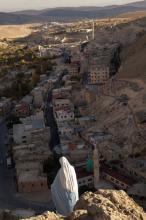
A huge statue of the Virgin Mary towers over churches, monasteries and mosques in the Syrian city of Maaloula, where a dialect of the Aramaic language of Jesus is still spoken.
The town has managed to stay out of the Syrian conflict between Sunni Muslim rebels and the regime of dictator Bashar Assad, as have most of Syria’s 2 million Christians.
But worsening violence has forced the community into a corner: Continuous clashes between the rebels and the regime in this isolated town of 2,000 people as well as other Christian towns over the past two weeks have many Christians worried that they will no longer be allowed to stay neutral.

Maybe you are like me and you need a bit of good news this week, because it’s been a week of bad news. There was the tragic shooting at the Navy Yard, leaving 12 people killed. Then there were the racist comments about the new Miss America, Nina Davuluri. She is the first person of Indian descent to be crowned Miss America, yet the news of the event emphasized racist tweets. It was almost as if people were competing over who could be the most racist: Some referred to her as “the Arab,” and other tweets claimed, “this is America, not India,” and one even called her “Miss 7-11.” Not to mention the continuing escalation of tensions throughout the world involving Syria.
It was a depressing beginning to the week. I mimetically absorbed much of this violence, hatred, and racism. Misanthropy settled into my soul and I began to loathe myself and the entire freakin’ human race.
But then I saw this video of Beyoncé performing in Brazil, and my hope in humanity was restored.

Before its Aug. 20 launch, officials at Al-Jazeera America emphasized that, despite its Middle Eastern roots and ownership, the fledgling cable news network would be aimed squarely at a U.S. audience.
Guess they weren’t kidding.
A new study of cable news coverage of the Syria crisis released found that the new kid on the block covered the fast-moving story of President Obama’s threat to strike the civil war-torn nation much the way its cable rivals did.
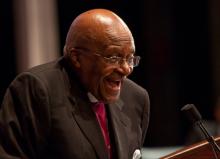
Retired Anglican Archbishop Desmond Tutu, who won the Nobel Peace Prize for his fight against apartheid in South Africa, continues to speak around the globe on justice and peace. Butler University and neighboring Christian Theological Seminary in Indianapolis announced Thursday that they would name a center for the 81-year-old icon.
Just before the announcement of the new center, Tutu spoke with Religion News Service about faith and justice, Israel and Palestine and Pope Francis’ recent selfie and lifestyle choices. Some answers have been edited for length and clarity.

Two weeks ago, it seemed that any minute the United States would begin bombing Syria. On Aug. 27, NBC’s top headline ran: “Military Strikes on Syria ‘as Early as Thursday,’ U.S. officials say.”
So our Quaker lobby did what all of us peace and security groups do when our country’s decision makers decide to bomb another country and we have long odds and little hope of success from stopping them: we flooded our network — including many of the inboxes of readers of this blog — with pleas to join us in writing, calling, and lobbying members of Congress and the Obama administration to stop this new war.
The pressure worked to postpone U.S. war plans. The groundswell of grassroots opposition to this war persuaded President Obama to go to Congress before launching Tomahawk cruise missiles into Damascus. A vote was expected in days, and then it was delayed, as an unprecedented outpouring of public opposition from Americans of every political stripe pushed Congress to pursue alternatives to military force.
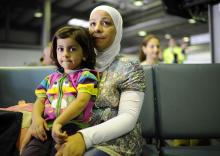
I have been literally disgusted at how “politics” has dominated the media’s response and coverage of the Syria crisis. Millions of lives are at stake, as is the security of one of the most critical regions of the world. But all many of our media pundits can talk about is how this affects politics — i.e., how this could weaken President Obama’s second term or what this might mean for Obamacare.
I heard the same media blathering when I was in London last week when the Syria chemical weapons crisis broke through. “Does the vote in Parliament hurt the Prime Minister and help his opposition?” “Is the Labor Party now up, and the Tory down?”
Who cares?!
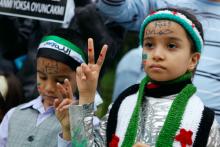
Even as the world’s powers grasped for a last-minute resolution to the crisis in Syria, it remained an open question whether any amount of diplomacy could prevent the conflict from claiming at least one more victim: the classic Christian teaching known as the “just war” tradition.
The central problem is not that the just war doctrine is being dismissed or condemned, but that it is loved too much. Indeed, both sides in the debate over punishing the Syrian regime for using chemical weapons are citing just war theory, but are reaching diametrically opposed conclusions.

As President Barack Obama prepared to address the nation on Tuesday evening to articulate a plan for intervention in Syria, NBC rushed to assure its viewers that the Ryan Seacrest-hosted game show, The Million Second Quiz, would not be interrupted. As detailed by the network, the president would speak for only 15 minutes, thus viewers could watch their televisions with full confidence that the entirety of the hyped-up program would be fully protected. While there was suspense as to whether NBC would follow through on its promise of an unbroken telecast, the presidential coverage stayed within the agreed upon time slot, viewers were able to watch their regularly scheduled program, and all was well in the world.
In the meantime, all is not well in the world.
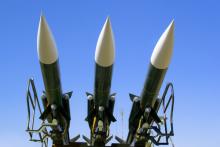
There’s a catch phrase that comes to the fore when people start looking for religious reasons not to enter a war like the one now raging in Syria: “Who would Jesus bomb?”
Jesus would not have bombed anyone, of course. Bombs were not weapons of choice in his day. But the cruelty of war was no stranger to his era. The Romans could be every bit as cruel as Syria’s Bashar al-Assad. They executed dissidents like Jesus himself with ease. They leveled the city of Jerusalem.
But if it is hard to imagine Jesus targeting a cruise missile aimed at another nation, it is not hard to imaging him encouraging his followers to stand with those who are most vulnerable, to seek ways to defend others from cruelty, to come to the aid of those refugees displaced by war. The question is how best to do that.

Right after 9/11, I asked a kid in my neighborhood what we should do in response. His answer: “Those people did something very wrong ...” He thought pensively and continued, “But two wrongs don’t make a right.”
As Martin Luther King taught us, you cannot fight fire with fire, you only get a bigger fire. You fight fire with water. You fight violence with nonviolence. You fight hatred with love.
As a Christian, a follower of Jesus the Prince of Peace, I am deeply troubled about the possibility of a military response to the violence in Syria. Jesus consistently teaches us another way to respond to evil, a third way – neither fight nor flight. He teaches that evil can be opposed without being mirrored, oppressors resisted without being emulated, enemies neutralized without being destroyed.
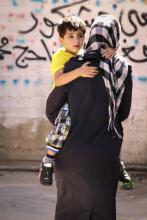
I have read countless articles from political, religious, and ethical perspectives on why or why not the U.S. should militarily intervene against the Syrian regime. Most do a decent job evaluating the situation, but I have yet to read one that really puts the human element on the table as a deciding factor.
A few months ago I was going to bed in my hotel room in Tel Aviv when I saw the breaking news alert that there was rocket exchange between Hamas and Israel in and around Gaza. While I have been to many places in "conflict," there is something much different about being somewhere that is only miles away from live fire.
I started playing out the situation in my head: "What if this expands into a major conflict? Can I catch a flight back home to be with my family before it gets worse? I'm only 30-40 miles away from the active conflict, am I already in range sitting in this hotel room?"
Anxiety. Fear. Uncertainty.
Now let me be clear, that experience of anxiety and fear is NOTHING compared to what most Israeli's, Palestinians, Egyptians, or Syrian's have felt in recent years (and MANY other populations). But — even if only in some small way — I could immediately feel the weight of pending war. It is palpable. It is crippling. And if I had my family with me, it would have potentially been unbearable.
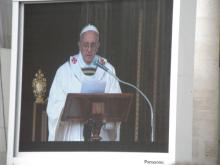
Pope Francis on Thursday told world leaders gathered in Russia for the G-20 summit that a military intervention in Syria would be “futile,” urging them to focus instead on dialogue and reconciliation to bring peace to the war-torn country.
The Argentine pontiff’s first major foray onto the global stage comes as the U.S. Congress prepares to vote on a military strike against Syria in response to a reported chemical weapons attack outside Damascus on Aug. 21.
For Francis, just six months on the job, the Syria question will test his ability to summon the power of his global bully pulpit and could play a major role in shaping the global image of a man who’s drawn more attention for his down-to-earth pastoral appeal.

“The mosques are our barracks, the domes our helmets, the minarets our bayonets and the faithful our soldiers.”
This was the Islamist poem quoted by the mayor of Istanbul, Turkey, in December 1997. Charged with using inflammatory speech, he was ejected from office and sentenced to jail by the Ankara High Court.
Today, that mayor, Recep Tayyip Erdogan, is prime minister of Turkey. During a decade in office, he has slowly but inexorably pushed secular Turkey, a member of NATO, toward an unabashedly Islamist future.
As a Muslim, I refuse to give up Islam to the Islamists. So should others who believe in a deeply pluralistic Islam of the sort my Indian-born grandparents taught. It is the only path to peaceful resolution of inevitable religious differences, within Islam and with other faiths.
Yet today pluralist manifestations of Islam are contracting. Never before has there been a time when Islam has been more threatened from within. That threat today is twofold: ideological and sectarian.
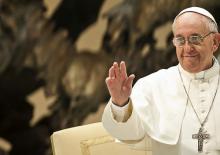
We learned the story in Sunday School.
Jesus and his inner circle — Peter, the rock, and James and John, the sons of thunder — came down from the Mount of Transfiguration and found the disciples facing their own inability to cast an unclean spirit out of a young boy. Annoyed with the disciples, Jesus says to the father: “If you believe, all things are possible to him who believes.” (Mark 9:23) The father replies: “Lord, I believe; help my unbelief.” (Mark 9:24) Jesus casts out the unclean spirit. Later, when the disciples ask why they were unable to do it, Jesus says that some only come out through prayer and fasting.